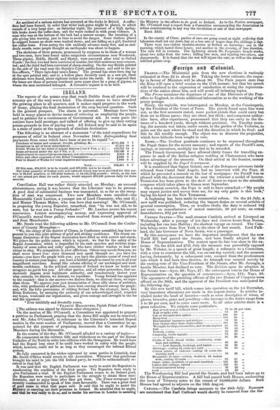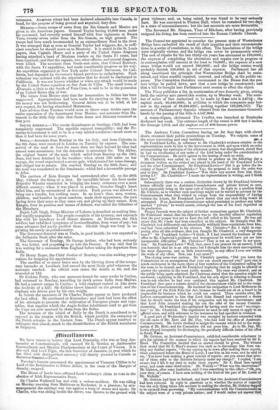joreign an eolonial.
FRANCE.—The Ministerial gain from the new elections is variously estimated at from 22 to about 40. Taking the lower estimate, the major- ity in favour of Ministers will be about 90. The Paris papers state that the King will open a brief session on the 17th instant; but that his speech will be confined to the expression of satisfaction at seeing tho representa- tives of the nation about him, and will avoid all irritating topics.
The Presse mentions the departure of one of the Directors of the Post- office to England, to obtain additional information as to the working of the penny postage.
Henry, the regicide, was interrogated on Monday, at the Conciergerie, by the President of the Court of Peers. The pistols found upon him were not, as the first accounts stated, mere pocket-pistols that could carry but from six to fifteen paces: they are short, but thick; and competent author- ities have, after experiment, pronounced that they can carry to the dis- tance of' a hundred yards, though without precision. On Tuesday morn- ing, the assassin was taken, under escort, to the garden of the Tuileries, to point out the spot where he stood and the direction in which he fired: and this he did readily enough. The object was to discover the projectiles, which have hitherto been sought in vain.
Roam—The liveliest gratitude continues to be expressed throughout the Papal States for the recent amnesty; and reports of the Pontiff's acts, sayings, or intentions, multiply too fast to be recorded.
The French Government have allowed thirty francs for travelling ex- penses to each of the Italian refugees residing at Chateauroux who have taken advantage of the amnesty. On their arrival at the frontier, money will be supplied by the Papal Government.
It is mentioned that Signor Galetti, one of the Bolognese prisoners lately released from Castel Sant' Angelo, had an interview with the Pope, at which he presented a memoir on the law of mortgages: the Pontiff was so pleased with the document that he sent the reformer a medal of honour. Permission has been given to the doeti of Rome to repair to the scientific congress which takes place at Genoa next September. On a recent occasion, the Pope is said to have remarked—" My people may expect justice and mercy from me, for my only guide is this book," laying his hand on the New Testament. A beginning has been made in commercial reform. On the 2d July, a new tariff was published, reducing the import-duties on several articles of general consumption. Thus, on woollen cloths the duty is reduced 54 per cent; on manufactures of mixed materials, 50 per cent; on cotton manufactures, 234- per cent.
UNITED STATES.—The man-steamer Cambria arrived at Liverpool on Wednesday, after a passage of ten days and sixteen hours from Boston, including her run into Halifax; the shortest voyage on record. The Cam- bria brings news from New York to the close of last month. Lord Falk- land, the late Governor of Nova Scotia, was a passenger.
By this conveyance we have the important intelligence that the new Tariff Bill had passed the Senate, and been finally adopted by the House of Representatives. The contest upon its fate was close in the ex- treme. On the 25th and 27th July the measure was powerfully opposed by Mr. Webster, in a speech of great length; a reference to a Committee, with a view to overthrow the bill, was on one day carried; and the measure having, fortunately, by a subsequent vote, escaped from the predicament into which it had been thus thrown, its triumph was secured merely by the casting-vote of the Vice-President of the Senate, after Mr. Jarnagin, a hostile Member, had declined to vote. The division upon its adoption in the Senate was—Ayes 28; Nays, 27: the subsequent vote in the House of Representatives on the question of concurrence—Ayes, 115; Nays, 93. l'he signatures of the presiding officers of the two Houses of Congress were affixed on the 30th, and the approval of the President was anticipated for the following day. By this new tariff bill, which comes into operation on the 1st December, very important alterations are made in the import-duties. In articles in- cluded under the head of luxuries—such as some description of wines, of gloves, brocades, gems and jewellery—the increase in the duties range from 5 to 20 per cent, and in some cases more. In all other articles there is 0. great reduction. We subjoin some particulars.
Bar or bolt Iron Is reduced from 73 to Nail or spike rods 99 Cut or wrought-iron spikes 168 Hoop-Iron 116 BlacksmIllue hammers and sledges 52 Iron chains other than chain-cables 101 Wrought for ships, locomotive, and steam-engines Si 76 36 73 Salt Velvets, cotton Carpeting, treble ingrain ingrain Cloths of wool—broad cloths, cassimeres, coat- ings, and padding 40 30 -- Low flannels, bockings, and balsas 38 30 Shirtings —costing 61 cents per yard 95 30 Cotton prints, or calicoes, costing 12 cents the
running yard 50 25 3foussenne de laine—cotton, worsted, 24 inches
wide, costing 12 cents 50 25 „ Glass—plain, moulded, or pressed tumblers 137 30 „ Cables and cordage, tarred 15:0 25 „ Unmanufactured hemp 39 30 o Coal 69 30 „
The Warehousing Bill had passed the Senate, and had been taken up to the House of Representatives. A bill had passed both Houses, authorizing the issue of Treasury notes to the extent of 10,000,000 dollars. Both Houses had agreed to adjourn on the 10th Augast.
CANADA.—The CallIhria brings accounts to the 29th July. RuMoUrS are mentioned that Earl Cathcart would shortly be removed from the Go- 30 per cent. 30
30 30 30 30 30 20 30 30 36 30
vernment. American wheat had been declared admissible into Canada, in bond, for the purpose of being ground and exported, duty-free.
Meemo.—Some scraps of news from the Rio Grande and Mexico are given in the American papers. General Taylor having 15,000 men under his command, had recently posted himself with four regiments at Buona Vista, twenty-seven miles from the Rio Grande, on high ground. The troops had been much incommoded by an extraordinary flood in the river. It was arranged that as soon as General Taylor had waggons, &c., in suffi- cient numbers he should move on to Monterey. It is stated in the St. Louis papers, that Captain Moore and a party of the United States dragoons having attacked a band of Mexican traders on the Santa Fe route, had been repulsed; and that the captain, two other officers, and several dragoons, were killed. The accounts from South-east state, that Colonel Kearney, with the Santa Fe expedition, had made considerable progress on his way. An expedition organized at New York under Colonel Stevenson, for Cali- fornia, had departed for Governor's Island previous to embarkation. Each volunteer was enlisted with the stipulation that he should be discharged in California. It was not known whether or when any attack would be made by the United States squadron on San Juan de Ulloa. The small town of Alvarado, a little to the South of Vera Cruz, is said to be in the possession of an United States ship of war. The letters from Mexico state that the insurrection in Jalisco has been suppressed. Appropriations had been made for carrying on the war, but the money was not forthcoming. General .Arista was to be tried, at his own request, for having abandoned Matamoras. Late advices from Yucatan would seem to throw some doubts upon the entire separation of the department from Mexico; and accounts from Ha- vannah to the 20th July state that Santa Anna and Almonte remained at that port.
SOUTH Asremca.—The recent disturbances at Santiago, Chili, had been completely suppressed. The republic enjoyed tranquillity; and the Pe- ruvian Government is said to be in a very settled condition—much more so than it had been for some years.
Lenm.—Accounts from Bombay to the 1st July, and from Calcutta to the 8th June, were received in London on Tuesday by express. The non- arrival of the mail at Suez for more than ten days beyond its time had caused some uneasiness; but the detention is accounted for. The Akbar, the original bearer of the mail, which sailed from Bombay on the 19th June, had been detained by the weather: when about 760 miles on her voyage, the vessel experienced a severe gale, which:caused her some damage, and obliged her to return. She reached Bombay on the 30th June; and the mail was transferred to the Semiramis; which had a favourable passage to Aden.
The garrison of Kote Kangra had surrendered after all, on the 28th May, without the firing of a shot. By incredible labour the force under Brigadier Wheeler succeeded in bringing the heavy ordnance over a most difficult country: when it was placed in position, Soondur Singh's heart failed him, and he surrendered at discretion. Each person was allowed to bring out a bundle, but nothing more. In an hour's time, men, women, children, and bundles in great numbers, made their appearance, the men king down their arms as they came out, and giving up their names. Kote Kangra, from its position and means of defence, was called the Gibraltar of the Himalaya. Rajah Lail Singh, Prime Minister of Lahore, is described as making him- self rapidly unpopular. The people complain of his tyranny, and reproach him with his treachery to all former masters. At Peshawur, the Sikh soldiers had exhibited symptoms of insubordination, from want of pay; but some advances had partly pacified them. Gholab Singh was busy in re- griating his newly-acquired country. The Governor-General was at Simla, in good health: he was expected in the Jullimder Doab after the rains.
The Governor of Bombay, Sir George Arthur, who had been seriously ill, was better, and preparing to go into the Deccan. It was said that he was waiting for a successor from England before taking his departure from India.
Sir Henry Roper, the Chief Justice of Bombay, was also making prepa- rations for resigning his appointment. The sacrifice of so many brave men by the blowing down of the tempo-. rary barracks at Loodiana had caused the most lively grief wherever the accounts reached. An official note states the deaths at 80, and the wounded at 135.
Sir Erskine Perry, who was monsoon-bound for some weeks in Ceylon, had returned to Bombay, travelling by dawk across India from Madras. He had a narrow escape in Ceylon: a wild elephant rushed at him down the declivity of a hill; Sir Erskine threw himself on the ground, and the elephant was driven past by his own weight. In Scinde the measures of Sir Charles Napier appear to have produced the best effect. He continued at Kurrachee; and such had been the effect of his attempts to promote the cultivation of European plants and vege- tables, that supplies which the Anglo-Indian inhabitants used to get from the Cape are now received by them from the Indus. The invasion of the island of Bally by the Dutch is considered to be opposed to the treaties with the British, 'which prohibit the extension of the Dutch colonies in the Eastern Seas. The Dutch appear resolved to subjugate that island; much to the dissatisfaction of the British merchants at Singapore.



























 Previous page
Previous page